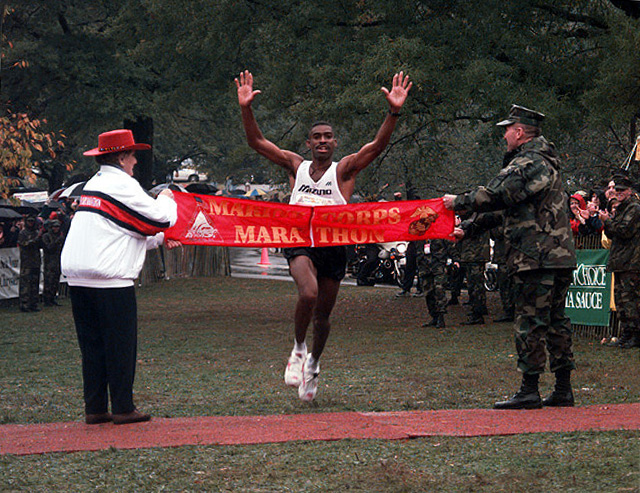Only since this century has the IAAF (International Association of Athletics Federations) officially ratified a 'world record' in the marathon event. Prior to that 'world bests' were listed, and even earlier to that there was no official listing of best times. Actually, early marathon events varied in distance, with the official standardized length of a marathon of 42,195 meters (or 26 miles and 385 yards) being set 28 years after the first marathon in 1896. The current and official marathon distance corresponds to the length of the marathon event at the 1908 London Olympic Games.
 marathon runners
marathon runnersOver the years the distance claimed for some courses have later been shown to be incorrect, and advantages of wind and downhill gradients have greatly assisted some times. In recent years, the IAAF has set guidelines for a marathon record to be set, such as "The start and finish points of a course, measured along a theoretical straight line between them, shall not be further apart than 50% of the race distance.", and that "The decrease in elevation between the start and finish shall not exceed an average of one in a thousand, i.e. 1m per km.". These criteria allow for records to be set on point to point courses as long as they satisfy these conditions, though there is a push to only recognize out-and-back marathon courses.
The Current World Records
The current men's marathon world record was set a the 2023 Chicago marathon Kelvin Kiptum from Kenya, set a new marathon world record with a time of two hours and 35 seconds, taking 34 seconds off the previous best. See the men's marathon record progression.
The current women's marathon world record is held by Ruth Chepngetich of Kenya. She shocked the running world by smashing the record on October 13, 2024. Chepngetich finished the Chicago Marathon in 2 hours, 09 minutes, and 56 seconds, beating the previous record by nearly two minutes. See the women's marathon record progression.
Related Pages
- Major marathon races from around the world
- More Athletics Records
- Other sports and fitness records
- Poll: Which record time will be broken next—100m or marathon?
- Sub 2-hour marathon blog post
- The Marathon at the Olympic Games



